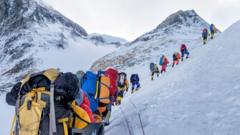As Nepal gears up for the climbing season, the cost to reach the top of Mount Everest will rise, and authorities stress the need for better management of the mountain's climbing capacity.
Nepal Increases Everest Climbing Permit Fees Amidst Overcrowding Concerns

Nepal Increases Everest Climbing Permit Fees Amidst Overcrowding Concerns
Nepal's government implements a significant hike in permit fees to climb Everest, citing the need to manage climber capacity.
In a significant move, Nepal's government has announced a new fee structure for climbing Mount Everest, which will see permit costs soar for the first time in nearly ten years. Beginning September, climbers will be required to pay $15,000 (£12,180) to ascend the world's tallest peak during the peak months of April to May. This fee marks a substantial 36% increase from the long-standing charge of $11,000. For those looking to climb outside the prime season, the permit fees will be adjusted to $7,500 for the months of September to November and $3,750 during the winter period from December to February.
Permit fees play a vital role in Nepal's economy, contributing over 4% of the country's GDP, with climbing and trekking activities supporting local communities. However, the government has faced increasing criticism from mountaineering experts regarding the high number of climbers allowed on Everest, which can reach approximately 300 permits annually. The recent fee increase had been anticipated, as discussions around it were ongoing throughout the previous year.
Narayan Prasad Regmi, Director General of the Department of Tourism, emphasized that the royalty had not been revised in many years, prompting the need for this update. He did not elaborate on how the additional income from the permit hikes would be allocated. British mountaineer Kenton Cool, who has summited Everest 18 times, remarked that the fee increase is unlikely to deter most foreign climbers due to the overall expenses associated with climbing the mountain. "Hopefully, the extra revenue will be put to good use," he expressed.
In April 2024, Nepal's Supreme Court mandated the government limit the number of climbing permits issued for Everest and other high peaks, citing the necessity to respect the mountains' natural capacity. Although no specific maximum was established, this ruling underscores growing concerns regarding the overcrowding jeopardizing climbers' safety as they face perilous queues to summit.
In response to the rising issues related to climber traffic, the Nepalese army initiated annual clean-up operations on Everest starting in 2019. Their efforts have reportedly removed 119 tonnes of refuse, along with 14 human remains and several skeletons, yet it is estimated that an additional 200 bodies remain on the mountain. With eight of the globe's highest mountains, including Everest, located in Nepal, the government is under increasing pressure to balance tourism with environmental and safety considerations.




















